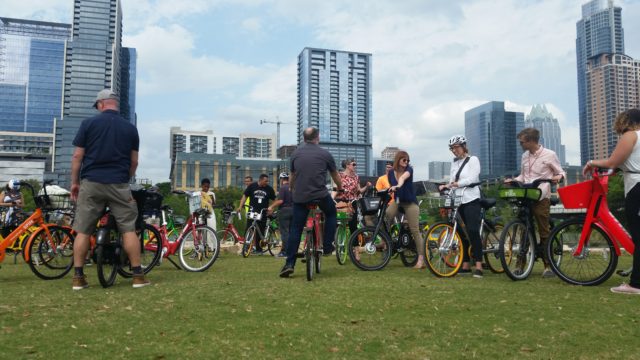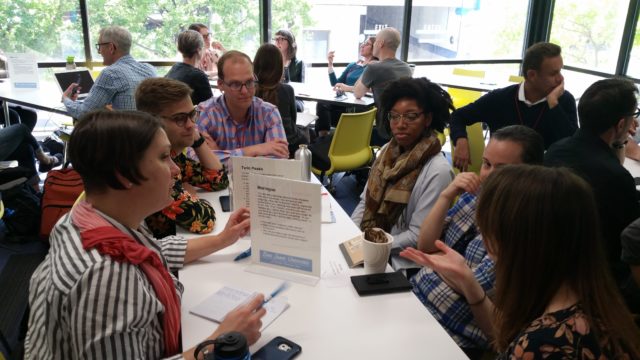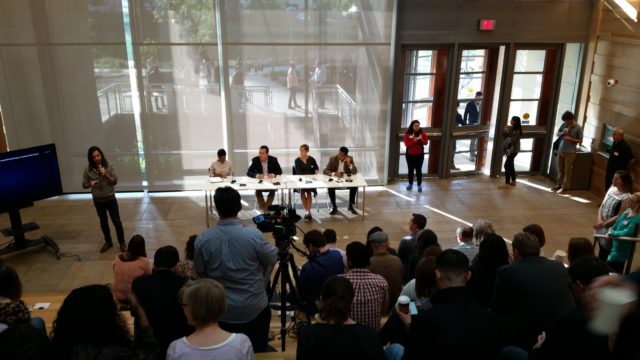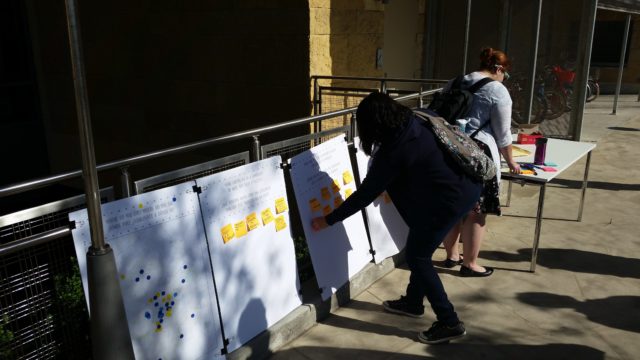On the banks of Austin’s Lady Bird Lake, sits Ai Wei Wei’s Forever Bicycle installation. The massive sculpture made up of 1,200 bicycles stacked on top of one another, was inspired by the artist’s childhood when bikes were the dominant transport mode in his native Shanghai. On a recent April morning, a group of about 50 bicycles from nine companies sat parked at the base of the statue, kicking off the start of The Better Bike Share Partnership and NACTO’s Bike Share Undocked Cities-only Roundtable.
Cities around the world are dealing with an influx of companies interested in bringing dockless bike share to their streets. Funded by venture capital and offering cheap rides to anyone with a smartphone, these companies have dramatically increased operations in the U.S. over the past year, going from zero to over 10 companies operating in dozens of cities. Questions abound: as NACTO’s 2017 Bike Share Data Snapshot showed, dockless now makes up 44% of the total US bike share fleet but only 4% of trips,
While more bikes on the ground are a great option for cities looking to reduce congestion, promote physical activity, or provide additional transport options, this new model of bike share does raise policy and logistical challenges that are not present in traditional dock-based systems. Among the topics discussed at the Roundtable, cities grappled with:
- Coordination with Local Governments
In the initial rollouts, some companies put down bikes in cities without any coordination with local governments, putting strain on local governments to maintain clear rights-of-way, and privatizing public space by fiat. Tasked with managing the public right-of-way, local government oversight is key to developing a successful bike share system that meets the needs of all users.
- Data Privacy
Experts have flagged dockless bike share user agreements and the requirements for riders to authorize access a wide array of personal information including, location, photos, cameras, and in some cases, personal contacts. While cities grapple with this new technological environment, it remains critical for users personal information to remain protected.
- Rebalancing and Parking
At the street level, managing bike distribution, and ensuring that companies maintain clear paths on sidewalks for pedestrians and remove broken bikes quickly can be challenging. Companies must work with cities to ensure that these new mobility options truly meet city mobility needs.
- Equitable Barriers to Use
Dockless bike share access is centered around credit cards and smartphone. This core requirement raises a number of questions about how cities can ensure that new mobility options are available to people across the income range.
To discuss these challenges and more, representatives from 33 NACTO cities gathered in Austin to discuss how to best regulate bike share and implement policies that allow these companies to operate in a way that supports cities to achieve their equity and mobility goals. Over the course of three days, we test-rode bikes from nine different operators, discussed common challenges and identified best practices, and participated in the launch of Austin’s public engagement process.
Here’s a closer look:
- The Dockless Bike Share Test Ride
- Nine companies brought bikes for participants to test ride around Lady Bird Lake near Downtown Austin. The ride started and ended near Ai Wei Wei’s Forever Bicycle sculpture and riders switched bikes along the route. While most were standard, 3-gear bikes, a few companies brought motorized models. These new electric pedal assist bikes offer a push when pedaling, helping riders to take on hills or rider faster without breaking a sweat.

- Advancing Equity in Bikeshare
- Equity was a top priority for discussion at the workshop. To set the stage, leaders from the Better Bike Share Partnership and the Government Alliance for Race & Equity (GARE) provided key professional training. Several cities provide discounted membership, prioritize station placement in underserved neighborhoods, and organize bike share ambassador programs to improve equity in traditional bikeshare systems. While some of the dockless systems are less expensive than traditional systems—especially on a per-ride basis—dockless systems create new equity challenges. Through a series of panel discussions and breakout groups, the group brainstormed how to set and measure equity goals in this new bikeshare landscape.

- Managing and Regulating Dockless Bikeshare
- Cites shared stories about emerging challenges for bike parking and maintenance, and collaborated on ideas for managing dockless systems. Since they can be left any place, cities reported some issues with bikes blocking the clear path or accumulating at key destinations. To date, most dockless companies lack capacity to moving bikes quickly. As a result, city crews have needed to move bikes that are incorrectly parked or need to be moved for weather or maintenance. To address these challenges, several cities are embedding requirements in the permit or license.
- Launching Austin’s Public Engagement Process
- On Wednesday, Austin held an event to gather public input about their new bike share pilot. The city is following a similar approach to Washington DC, allowing dockless bikeshare providers to operate for a pilot period. A pitch session from operators was followed by a panel that included representatives from Austin, San Francisco, Seattle, and facilitated by Nicole Payne, NACTO’s Cities for Cycling & Bike Share Program Manager. The panel discussed their outlook on private enterprise operating within public space, data and privacy concerns, and the role bike share plays in expanding mobility options for underserved communities.


- Using the Shared Streets Platform to Organize Data and Support Decision Making
- During the final session, NACTO’s Mollie Pelon and Kevin Webb of Open Transport Partnership presented Shared Streets—an open source platform that helps cities to collect, manage, process, and analyze transportation data. The platform serves as a neutral space for companies to share anonymized data and provides tools to support cities to use the data to explore mobility patterns and inform transport decisions.
:::::
The quickly changing environment, means that cities need to feel empowered in their role of managing the public right of way for the benefit of our communities. With the newest bike share model – dockless bike share – exploding onto the sidewalks of the United States in Summer of 2017, the Austin Roadshow provided the much needed opportunity for cities to exchange ideas and share information. The Better Bike Share Partnership and NACTO would like thank the City of Austin for hosting this event, and we look forward to continuing our work with cities to help them manage and improve the public realm.
